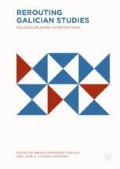Abstract
This chapter studies the work of Manuel Fraga as that of the greatest ghostly writer of recent Galician literature. In psychoanalytical terms, he is its main referent: The master signifier of the agency that regulates the symbolic order of Galicia. Literary history’s refusal to engage with Fraga has always had the effect of generating his repeated return and haunting, as he defined the continuation of Francoism by other means in Galicia, and more generally, in Spain. This chapter further argues that Fraga managed to advance a postnationalist history and theory of Galician literature and culture, which instead of highlighting the oppression inflicted by Spanish imperialism/colonialism, created a non-democratic‚ populist‚ and affective unity of Galicia’s history and future as universal (thus, reworking the Francoist “Spanish universalism through unity”). It concludes that in the 1990s and 2000s, the nationalist left in Galicia‚ due to its rationalist politics‚ did not take seriously the politics of affect in its historical complexity and thus enabled Fraga’s hegemony.
Access this chapter
Tax calculation will be finalised at checkout
Purchases are for personal use only
Bibliography
Benjamin, Walter. “Theories of German Fascism: On the Collection of Essays War and Warrior, Edited by Ernst Jünger.” New German Critique 17 (1979): 120–128.
Castro, Rosalía de. En las orillas del Sar. Barcelona: Akal, 1993.
Cervera, César. “‘Spain is Different,’ el eslogan que cambió para siempre la imagen de España.” ABC, 27 March 2015.
Crumbaugh, Justin. Destination Dictatorship: The Spectacle of Spain’s Tourist Boom and the Reinvention of Difference. New York: SUNY Press, 2009.
Foucault, Michel. The Birth of Biopolitics: Lectures at the College de France, (1978–1979). New York: Picador, 2010.
Fraga Iribarne, Manuel. Galicia ayer, hoy, mañana. Santiago de Compostela: Xunta de Galicia, 1989.
______. La cultura gallega, pasado, presente y futuro. Santiago de Compostela: Xunta de Galicia, 1990.
______. Álvaro Cunqueiro: dos discursos. Santiago de Compostela: Xunta de Galicia, 1991.
______. A Galiza e Portugal no marco europeu. A Coruña: Xunta de Galicia, 1991.
______. Da acción ó pensamento. Vigo: Ir Indo, 1993.
______. Galicia fin de milenio. Barcelona: Planeta, 1997.
Gabilondo, Joseba. Before Babel: A History of Basque Literatures. Lansing: Barbaroak, 2016.
______. “Spanish Nationalist Excess: A Decolonial and Postnational Critique of Iberian Studies.” Prosopopeya: revista de crítica contemporánea 8 (2014): 23–60.
González-Millán, Xoán. Resistencia cultural e diferencia histórica: a experiencia da subalternidade. Santiago de Compostela: Sotelo Blanco, 2000.
Hooper, Kirsty. Writing Galicia into the World. New Cartographies, New Poetics. Liverpool: Liverpool University Press, 2011.
Lacan, Jacques. The Four Fundamental Concepts of Psycho-Analysis. New York: Norton Co., 1981.
Laclau, Ernesto. On Populist Reason. London and New York: Verso, 2007.
Miguélez-Carballeira, Helena. Galicia, a Sentimental Nation: Gender, Culture and Politics. Cardiff: University of Wales Press, 2013.
_____. A Companion to Galician Culture. London: Tamesis Books, 2014.
Piñeiro, Ramón. Filosofía da saudade. Vigo: Galaxia, 1984.
Reimóndez, María. “Whose Heritage Is It, Anyway? Cultural Planning and Practice in Contemporary Galicia.” In Contemporary Galician Cultural Studies. Between the Local and the Global, eds. Kirsty Hooper and Manuel Puga Moruxa, 190–201. New York: The Modern Languages Association, 2011.
Ríos Bergantinhos, Noa. “Contemporary Galizan Politics: The End of a Cycle?” In A Companion to Galician Culture. ed. Helena Miguélez-Carballeira, 195–211. London: Tamesis Books, 2014.
Rivas, Manuel. Galicia, el bonsai atlántico. Madrid: Aguilar, 1994.
Žižek, Slavoj. “The Simple Courage of Decision: A Leftist Tribute to Thatcher.” New Statesman, 17 April 2013.
Author information
Authors and Affiliations
Editor information
Editors and Affiliations
Rights and permissions
Copyright information
© 2017 The Author(s)
About this chapter
Cite this chapter
Gabilondo, J. (2017). The Master Signifier of Galician Culture: Manuel Fraga and Undemocratic, Affective Populism. In: Sampedro Vizcaya, B., Losada Montero, J. (eds) Rerouting Galician Studies. Palgrave Macmillan, Cham. https://doi.org/10.1007/978-3-319-65729-5_11
Download citation
DOI: https://doi.org/10.1007/978-3-319-65729-5_11
Published:
Publisher Name: Palgrave Macmillan, Cham
Print ISBN: 978-3-319-65728-8
Online ISBN: 978-3-319-65729-5
eBook Packages: Literature, Cultural and Media StudiesLiterature, Cultural and Media Studies (R0)

